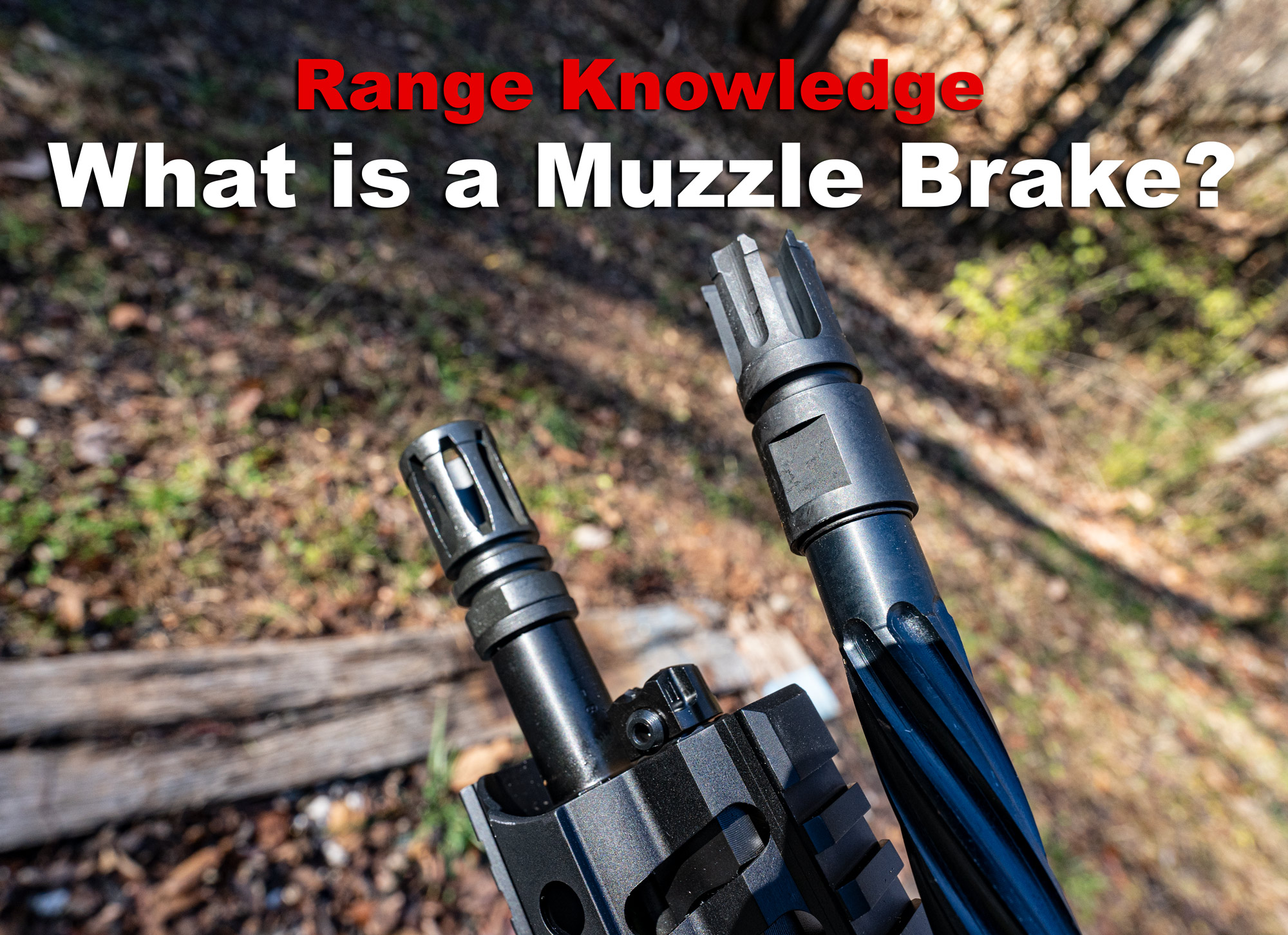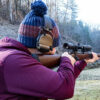An easy to follow guide to what muzzle brakes are and how they impact your shooting.
A muzzle brake is a muzzle attachment that vents propellant gas through ports, ejecting it to the side, top, and bottom. Muzzle brakes are also sometimes called recoil compensators. The device helps reduce the amount of recoil you feel as a shooter. With less recoil, at least in theory, you can fire shots more accurately.
By directing gas outward, the pressure you feel as a shooter (called “felt recoil”, which is technically different from actual recoil) is reduced. Essentially, instead of pressure being driven backward into the shooter’s hands or shoulder, it is driven to the sides, upward, and downward.
Why Use a Muzzle Brake?

Reducing recoil has many advantages for you as a shooter. It typically means superior accuracy, more comfort while shooting, and the potential for greater confidence with a firearm. We’ve found confidence tends to lead to greater performance.
While the physics and engineering can be complicated, it’s really little more than an attachment at the end of a gun that make the weapon feel easier to shoot.
Advantages of a Muzzle Brake

There can be many advantages to using a muzzle brake. The most cited benefit is a reduction in muzzle rise, which is directly connected to recoil. When a gun is fired, there is backward pressure; this pressure not only pushes the gun back, but because the barrel is above the gun’s center of mass, there is an upward pressure as well. (If, somehow, the barrel were below the center of mass, there would be downward pressure.)
By reducing the pressure that goes back into the rifle, a muzzle brake reduces the amount that a gun will rise when fired. This can allow a shooter to better follow the impact of a bullet, improve visibility after a shot, and allow for better follow up shots.
There is, of course, greater comfort if you use a muzzle brake. If you find that the weapon is difficult to handle, hard on your hands, or hurts your shoulder, you may try adding a muzzle brake to the firearm. Of course, some will say that the real solution would be to change your firearm and cartridge. A muzzle brake could make at least a reasonable improvement, especially if you already have a firearm but, because of recoil, don’t enjoy shooting it.
Disadvantages of Muzzle Brakes
Besides the price of actually purchasing a muzzle brake, there are reasons why some shooters choose to avoid muzzle brakes on their firearms.
Above all is noise. When the firearm vents propellant, it increases the overall noise made at the barrel of the firearm. The biggest reason for the sound being louder is that the brake directs the sound backwards, meaning it goes towards the shooter almost directly. Not only will the sound be louder for the shooter, but it can be annoying for others at the range. Of course, we always recommend ear protection, regardless of whether or not you have a muzzle brake.
Another disadvantage is that they can kick up dust. As gas is pushed outwards and to the side, it can push up dust and debris; this might not be a problem when shooting from a table, but if you are shooting from the prone position in a dusty location, it could leave a cloud of dust in your face. This is not only unpleasant, but it reduces your chances of seeing the target.
When Should You Consider a Muzzle Brake?

If you experience one or more of these situations, a muzzle brake may be right for you…
You Find a Gun Uncomfortable to Shoot
Some people will find high-caliber ammunition and big-bore weapons to be uncomfortable, especially over high-volume shooting. If you find that your shoulder or hands are sore, you should not only reconsider your shooting technique, but you could also consider a muzzle brake.
You Need to Make Followup Shots
If you are placing one shot with long pauses in between, then you don’t necessarily need a muzzle brake. But if you need to place extremely fast followup shots, either for personal defense or competition, it could help. In fact, these accessories are common at the competition level. (The issue here is that muzzle brakes extend the weapon, making conceal-carry difficult.)
You Use a Powerful Cartridge in a Light Weapon
The heavier the weapon, the more it will absorb recoil. Therefore, if you fire a large cartridge from a relatively light firearm, a muzzle brake could be a good choice to reduce impact on your hands and shoulder.
What Weapons Can You Improve?
Rifles
Many hunters choose to place muzzle brakes on their rifles to reduce recoil. While personal preference will dictate whether you choose a muzzle brake, some candidates include…
- .300 Winchester Magnum
- 7mm Remington Magnum
- 6.5mm Creedmoor
Pistols
Whether for self defense or competition, you can make many high-powered pistol cartridges more manageable with a muzzle brake, including…
- .45 ACP
- .40 S&W
Shotguns
You can improve shotguns with a muzzle brake as well. Home defense shotguns, as well as hunting firearms, can use these accessories, especially if they load the following…
- 12 gauge
- 10 gauge
Of course, this is just a short list. In reality, you could improve just about any firearm with a muzzle brake.

